Table of Contents
- Understanding the Natural Lifespan of Horses
- The Average Life Expectancy of Different Horse Breeds
- How Long Do Horses Live in Different Environments
- Comparing Pony and Horse Lifespans
- Factors That Influence Horse Longevity
- The Impact of Healthcare on Horse Lifespan
- Signs of Aging in Horses
- Caring for Senior Horses: Essential Guidelines
- Record-Breaking Horse Ages Throughout History
- Common Health Issues in Aging Horses
- Nutrition Requirements for Aging Horses
- Exercise and Activity for Elderly Horses
- Making End-of-Life Decisions
- Conclusion
- FAQ
Ever wondered how long a horse might be your companion? The lifespan of horses is a topic that surprises many. While many think horses live short lives, the truth is quite different.
Understanding a horse’s lifespan involves looking at several factors. Domesticated horses usually live between 25 to 30 years. Some horses, however, can live into their 40s. The breed, care, environment, and health of a horse all affect how long it can live.
Different horse breeds have different lifespans. This makes the study of horse aging complex and interesting. From working horses to thoroughbreds, each breed has its own traits that influence its lifespan.
Key Takeaways
- Average horse lifespan ranges from 25 to 30 years
- Breed, care, and environment significantly impact longevity
- Some horses can live exceptional lives beyond 40 years
- Proper nutrition and healthcare extend horse lifespans
- Individual horses may vary widely in their life expectancy
Understanding the Natural Lifespan of Horses
Horses have amazed humans for centuries. They can live and thrive in many places. Their long lives are due to their ability to adapt and their biology.
Domestic horses live longer than wild ones. Wild horses face tough environments, while domestic ones get better care and food.
Comparing Wild and Domestic Horse Lifespans
- Wild horses: 15-20 years average lifespan
- Domestic horses: 25-30 years average lifespan
- Exceptional horses: Some may live up to 40 years
Factors Influencing Natural Horse Lifespan
Many things affect how long horses live:
- Genetic predisposition
- Nutritional quality
- Environmental conditions
- Medical care
- Activity levels
| Factor | Impact on Lifespan |
|---|---|
| Genetics | Determines potential longevity |
| Nutrition | Directly affects health and vitality |
| Healthcare | Prevents and manages age-related issues |
Historical Perspectives on Horse Longevity
“Horses are not just animals, they are living historical records of survival and adaptation.” – Equine Researcher
For centuries, humans have changed horses’ lives. They went from working animals to pets. This change has led to better care and health for them.
Learning about horse longevity helps us understand their amazing survival skills.
The Average Life Expectancy of Different Horse Breeds
Horse breeds vary greatly in how long they live. Some breeds live much longer than others. Genetics are key in determining a horse’s lifespan, leading to big differences between breeds.
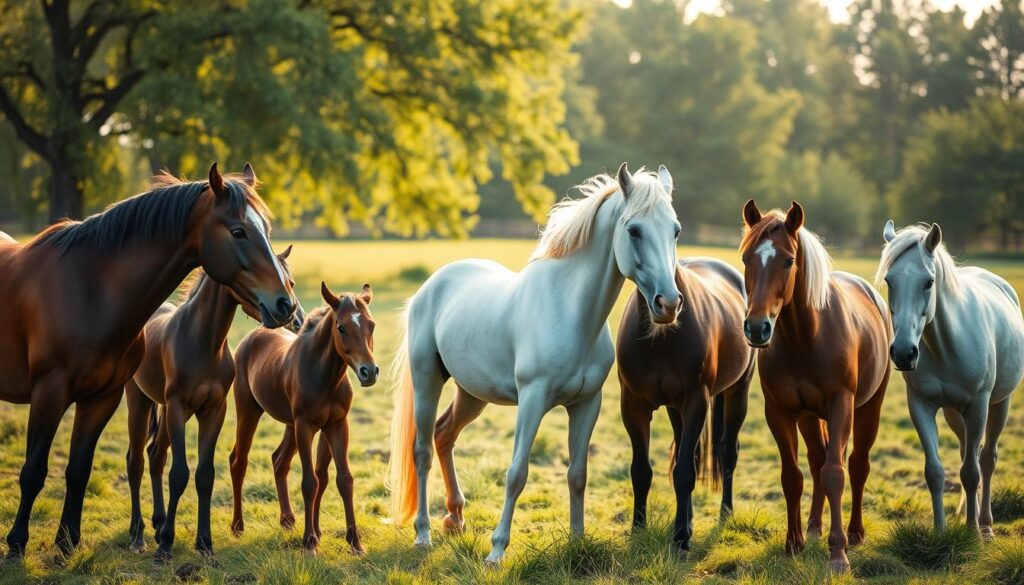
Knowing how long different breeds live helps horse owners make better choices. Some breeds have special genes that help them live longer.
- Arabian Horses: Known for exceptional longevity, often living 25-30 years
- Quarter Horses: Typically live 25-35 years
- Appaloosa Breeds: Average lifespan of 20-30 years
- Icelandic Horses: Remarkable durability, living up to 40 years
The longest living horse breeds share some traits:
- Strong genetic heritage
- Robust physical constitution
- Adaptability to various environments
- Consistent healthcare and nutrition
“Not all horse breeds are created equal when it comes to lifespan” – Equine Veterinary Association
Genetics play a big role in how long a horse can live. Smaller breeds and ponies usually live longer than big draft horses. This shows how genetics and life expectancy are closely linked.
How Long Do Horses Live in Different Environments
The environment greatly affects how long horses live. Knowing how different places impact their health helps owners care for them better.
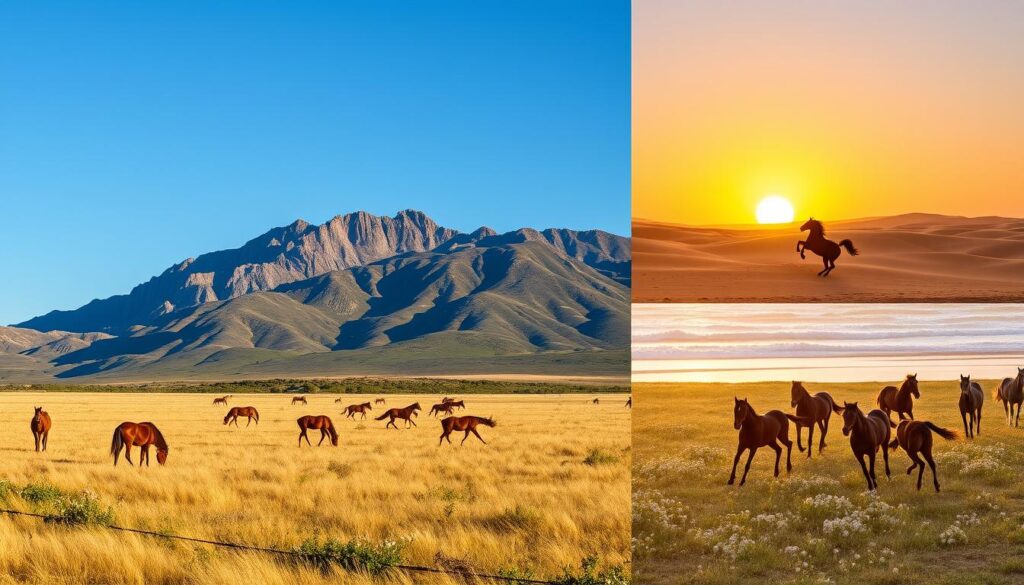
Impact of Climate on Horse Longevity
Climate is key to a horse’s health and how long it lives. Extreme weather can stress a horse and harm its health.
- Temperate climates support better overall horse health
- Extreme heat or cold can accelerate aging processes
- Consistent environmental conditions promote longevity
Stabled vs. Pasture-Kept Horses
The place a horse lives in affects its health a lot. Stabled horses get regular care, while pasture-kept horses get natural exercise.
| Living Environment | Advantages | Potential Challenges |
|---|---|---|
| Stabled Horses | Protected from elements, regular veterinary care | Limited movement, potential muscle atrophy |
| Pasture-Kept Horses | Natural exercise, social interaction | Exposure to weather, potential predators |
Environmental Stress Factors
Horses are sensitive to stress from their environment. Pollution, noise, and habitat quality are important for their long-term health.
“The right environment can add years to a horse’s life and life to its years.” – Equine Health Expert
Managing these stressors well can help a horse live longer and stay healthy as it ages.
Comparing Pony and Horse Lifespans
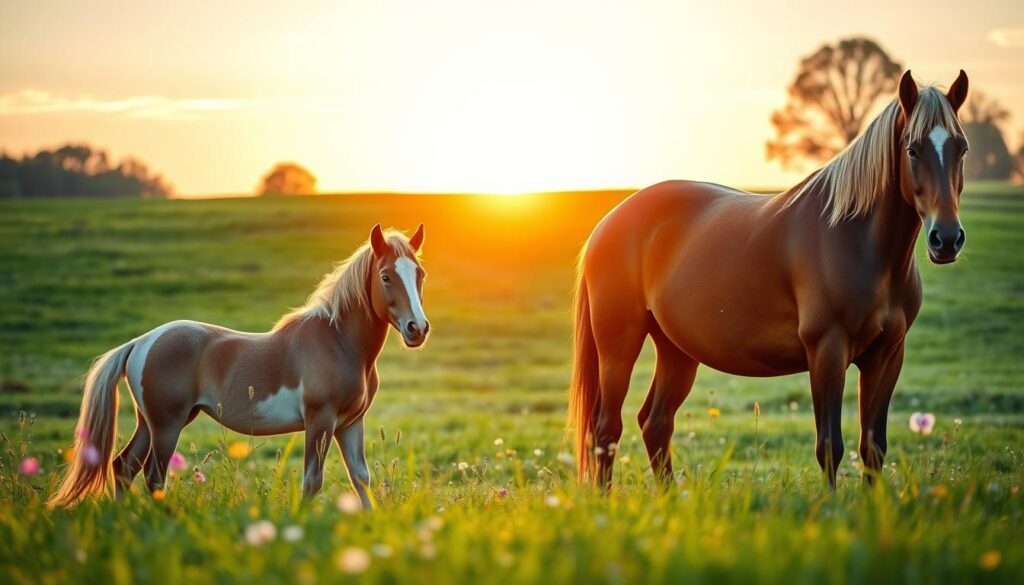
Many horse lovers are curious about the lifespan of ponies compared to horses. Ponies usually live longer than horses. They can live from 25 to 35 years, while horses live from 25 to 30 years.
Several key factors contribute to the differences in pony longevity:
- Size matters: Smaller equines typically enjoy longer lifespans due to reduced physical stress
- Genetic variations between pony breeds impact their overall health and longevity
- Specialized care and nutrition play crucial roles in extending pony life expectancy
“Ponies are the marathon runners of the equine world, often outliving larger horse breeds by several years.” – Equine Veterinary Research
Researchers have studied why ponies might live longer than horses. They found that certain pony breeds live much longer. For example, Shetland and Welsh ponies can live up to 40 years or more.
| Pony Breed | Average Lifespan | Typical Size |
|---|---|---|
| Shetland Pony | 30-35 years | Under 11.2 hands |
| Welsh Pony | 25-35 years | 11-14.2 hands |
| Standard Horse Breed | 25-30 years | 15-17 hands |
The key to a long life for ponies is good care and nutrition. Regular vet visits also help. While genetics are important, how well a pony is cared for can make a big difference.
Factors That Influence Horse Longevity
Knowing what affects a horse’s lifespan is key for owners wanting their horses to live long, healthy lives. Many things can influence a horse’s life span, from genetics to how they are cared for.
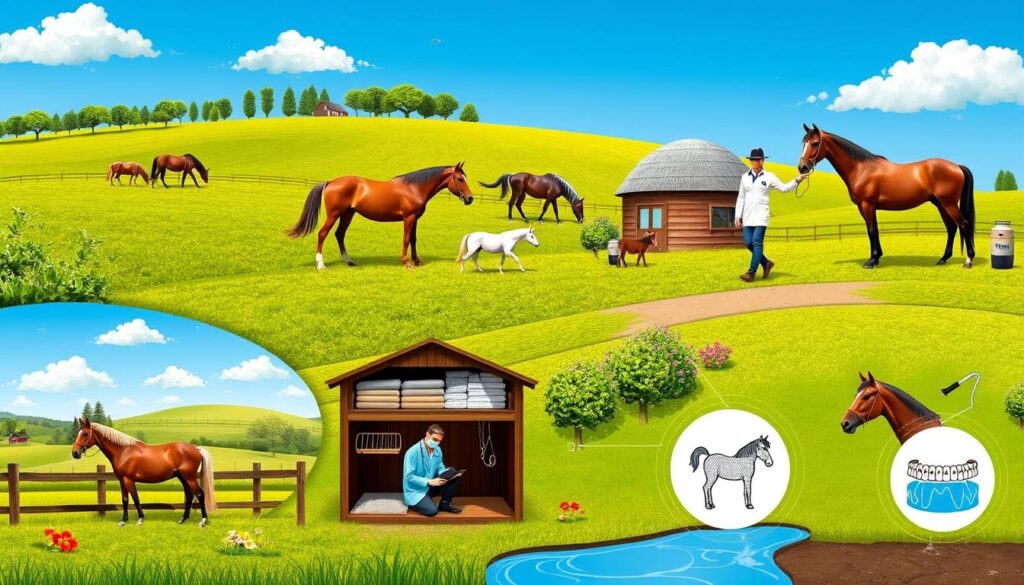
The life span of a horse is shaped by several important factors. These elements work together to affect a horse’s health and how long it might live.
Genetic Predisposition
Genetics are a big factor in how long a horse can live. Some breeds naturally live longer than others. For example:
- Arabian horses often live 25-30 years
- Appaloosas typically reach 25-35 years
- Quarter Horses can live 25-35 years
Diet and Nutrition Impact
Nutrition is vital for a horse’s life span. A balanced diet helps keep a horse healthy and can add years to its life.
| Nutritional Component | Impact on Longevity |
|---|---|
| Quality Hay | Essential for digestive health |
| Balanced Minerals | Supports bone and muscle strength |
| Protein Intake | Maintains muscle mass and immune function |
Exercise and Activity Levels
Regular exercise is crucial for a horse’s long life. The right amount of activity keeps a horse’s heart, muscles, and mind sharp.
“A well-exercised horse is a healthy horse” – Equine Veterinary Association
Exercise that matches a horse’s age and health is important. It keeps a horse physically and mentally fit, helping it live longer.
The Impact of Healthcare on Horse Lifespan
Proactive healthcare is key to a longer life for horses. Thanks to advanced veterinary medicine, older horses can live healthier, longer lives.
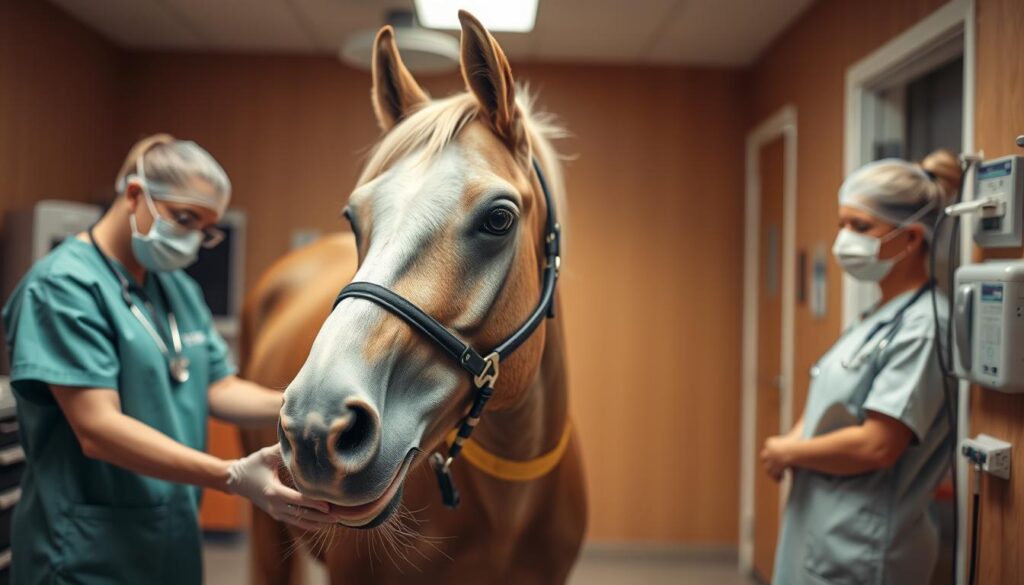
Vets suggest detailed healthcare plans for horses at all life stages. For seniors, these plans are even more important. They help keep the horses healthy and prevent age-related issues.
- Regular veterinary check-ups
- Comprehensive vaccination protocols
- Preventive medical screenings
Dental care for senior horses is very important. Older horses often face dental problems that affect their nutrition and health. Professional equine dentists can check their teeth and fix any issues early on.
“Prevention is always better than cure in horse healthcare” – Veterinary Equine Association
Hoof care for older horses needs special knowledge and regular checks. As horses age, they may get arthritis or other issues that affect their hooves.
| Healthcare Aspect | Senior Horse Considerations |
|---|---|
| Dental Care | Annual comprehensive dental examinations |
| Hoof Management | Specialized trimming and potential therapeutic shoeing |
| Nutritional Support | Age-specific dietary supplements |
Investing in consistent, high-quality healthcare can significantly extend a horse’s lifespan and improve their overall well-being.
Signs of Aging in Horses
Knowing how to spot aging in horses is key for caring for them well as they get older. Horses change physically and behaviorally as they age. This is important for their care.
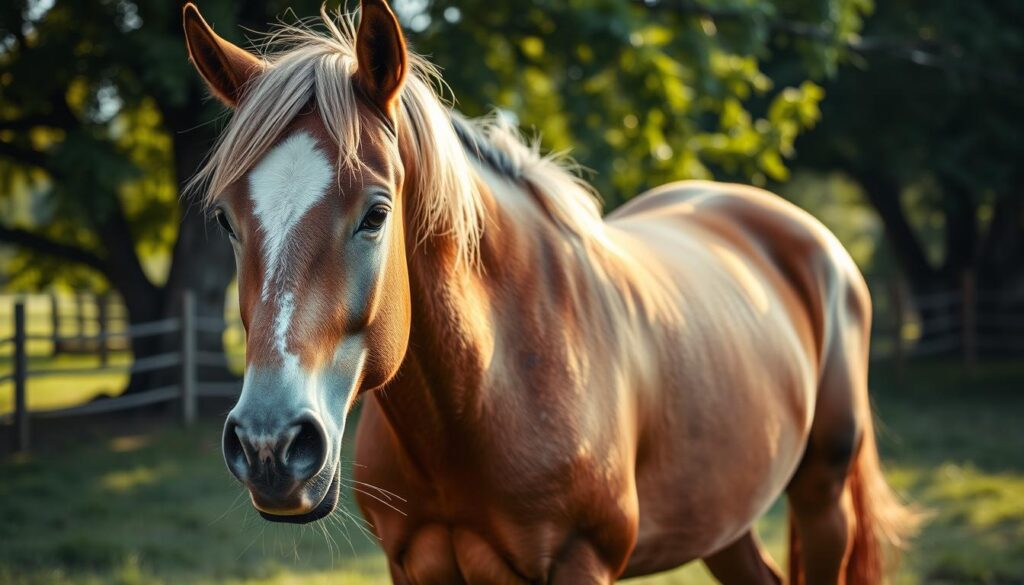
Physical Changes in Aging Horses
Spotting a horse’s age involves looking at physical changes. Key signs include:
- Graying coat, especially around the face and muzzle
- Reduced muscle tone and body condition
- Decreased overall flexibility
- Weight fluctuations
Behavioral Modifications
Behavioral changes also help guess a horse’s age. Older horses often show:
- Reduced energy levels
- Decreased social interaction
- More cautious movement
- Increased sensitivity to environmental changes
Health Indicators of Equine Aging
Teeth are a traditional way to guess a horse’s age. Dental wear patterns tell a lot about a horse’s age.
| Age Range | Dental Characteristics | Physical Indicators |
|---|---|---|
| 15-20 years | Moderate tooth wear | Slight coat graying |
| 20-25 years | Significant tooth wear | Noticeable muscle loss |
| 25+ years | Advanced dental changes | Substantial physical modifications |
“Recognizing aging signs early allows horse owners to adjust care strategies and maintain their horse’s quality of life.” – Equine Veterinary Association
Regular vet visits and careful watching help owners manage their horse’s aging. This keeps their horses comfortable and healthy.
Caring for Senior Horses: Essential Guidelines
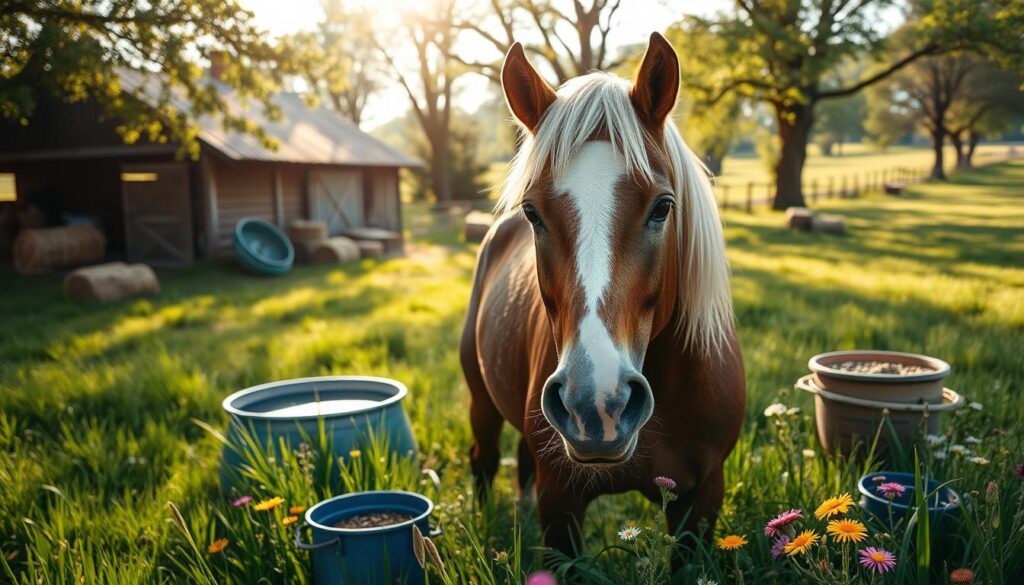
Keeping senior horses healthy needs careful planning. As they get older, their diet and care change a lot. It’s important to follow senior horse care tips to keep them comfortable and healthy.
Feeding senior horses requires extra attention. They often face dental problems and have trouble digesting food. Vets suggest using special senior horse feed that:
- Is easier to digest
- Has the right mix of protein and fat
- Includes supplements for joint health
“Good nutrition is the foundation of senior horse wellness,” says Dr. Rebecca Martinez, equine veterinarian specializing in geriatric horse care.
Regular health checks are key. Maintaining health in senior horses means:
- Visiting the vet every six months
- Checking their teeth regularly
- Keeping vaccinations up to date
- Managing their weight well
Also, think about their living environment. Make sure they have a safe place to stay, comfy bedding, and less stress. Gentle exercise helps keep their muscles and joints flexible.
Every horse ages differently, so care plans must be tailored. Work with your vet to create a care plan that meets your horse’s specific needs.
Record-Breaking Horse Ages Throughout History
The world of horses is filled with stories of horses living long lives. Some horses have lived far beyond what we expect. They show us that horses can live healthy and useful lives for many years.
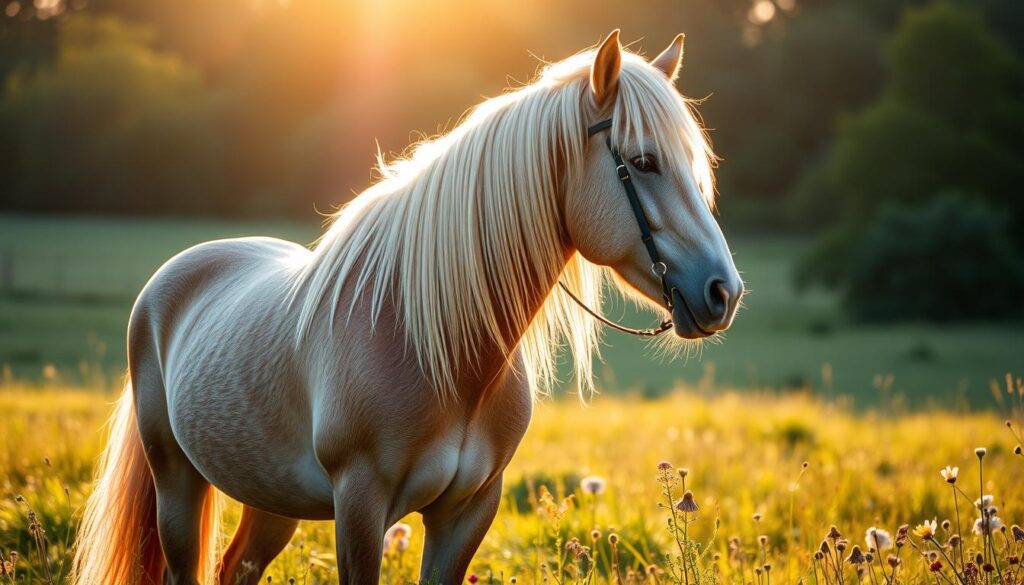
Looking at the oldest recorded horse ages, we find amazing stories of resilience. These horses have amazed veterinarians, horse lovers, and researchers.
Exceptional Longevity Champions
- Old Billy: Recognized as the longest-lived horse in documented history
- Shayne: A remarkable horse who lived to an impressive age
- Magic: An exceptional equine who demonstrated extraordinary longevity
Verified Longevity Records
| Horse Name | Verified Age | Country of Origin |
|---|---|---|
| Old Billy | 62 years | United Kingdom |
| Shayne | 51 years | United Kingdom |
| Magic | 48 years | United States |
“Some horses transcend ordinary expectations, becoming living legends of longevity and resilience.” – Equine Research Foundation
These horses show us that with the right care, horses can live much longer than usual. Their stories encourage horse owners to focus on their health and well-being.
Factors Contributing to Extraordinary Lifespans
- Exceptional genetic predisposition
- Consistent high-quality nutrition
- Minimal environmental stress
- Regular veterinary care
While these ages are rare, they show us the potential for horses to live long, healthy lives. The oldest recorded horse ages prove that with the right care, horses can be very durable. They also highlight the importance of comprehensive care for horses.
Common Health Issues in Aging Horses
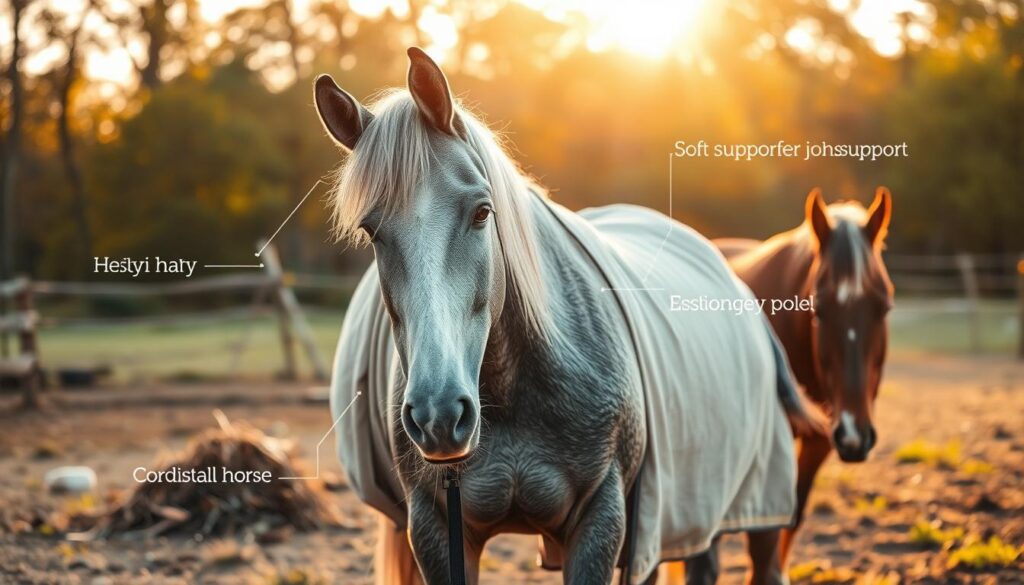
As horses get older, they face more health problems. Knowing these issues helps owners care for them better. This keeps their horses happy and healthy.
Senior horses deal with serious health issues. They need close watch and early action:
- Arthritis and joint wear
- Dental issues that hurt their eating
- Metabolic problems
- Weaker immune systems
It’s key to stop colic in older horses. Their digestive systems slow down. This makes them more likely to get stomach problems.
| Health Issue | Symptoms | Management Strategy |
|---|---|---|
| Arthritis | Stiff movement, reluctance to walk | Regular gentle exercise, joint supplements |
| Dental Problems | Weight loss, difficulty eating | Annual dental exams, soft food |
| Metabolic Disorders | Insulin resistance, weight gain | Controlled diet, regular vet checks |
Older horses often have soundness issues. Vets suggest geriatric checks to find and fix problems early.
“Early detection and proactive management are key to maintaining a senior horse’s health and comfort.” – Equine Veterinary Association
Regular vet visits, good food, and special exercise plans help aging horses. They can stay active and healthy longer.
Nutrition Requirements for Aging Horses
Feeding senior horses needs special care. As they age, their diet must change. It’s important to know how to feed them right.
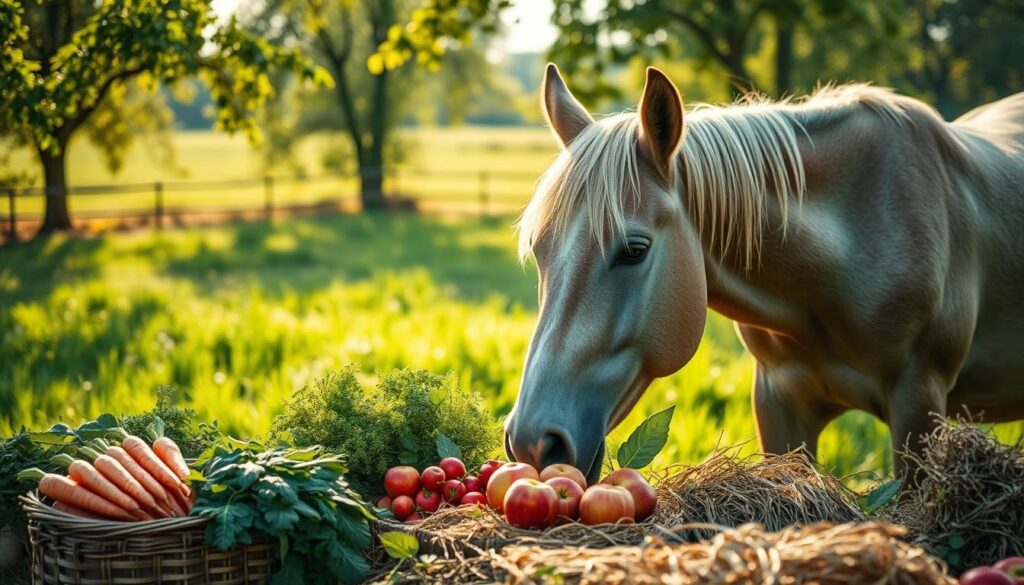
Aging horses have unique nutrition needs. Their metabolism slows down, and they digest food less well. They also absorb nutrients harder.
Dietary Adjustments for Senior Horses
When feeding senior horses, focus on these key points:
- Choose easily digestible, high-quality feeds
- Increase fiber content in daily diet
- Reduce hard-to-digest grains
- Monitor body weight regularly
Supplement Considerations
Special supplements can help aging horses:
| Supplement Type | Benefit |
|---|---|
| Joint Supplements | Reduces inflammation, supports mobility |
| Vitamin E | Supports immune system |
| Omega-3 Fatty Acids | Promotes overall health |
Feeding Schedule Modifications
Changing the feeding schedule is key for aging horses. Smaller, more frequent meals help with digestion and nutrient absorption.
“Nutrition is the foundation of health for senior horses” – Equine Nutrition Expert
By using these nutritional strategies, owners can help their aging horses stay healthy and comfortable.
Exercise and Activity for Elderly Horses
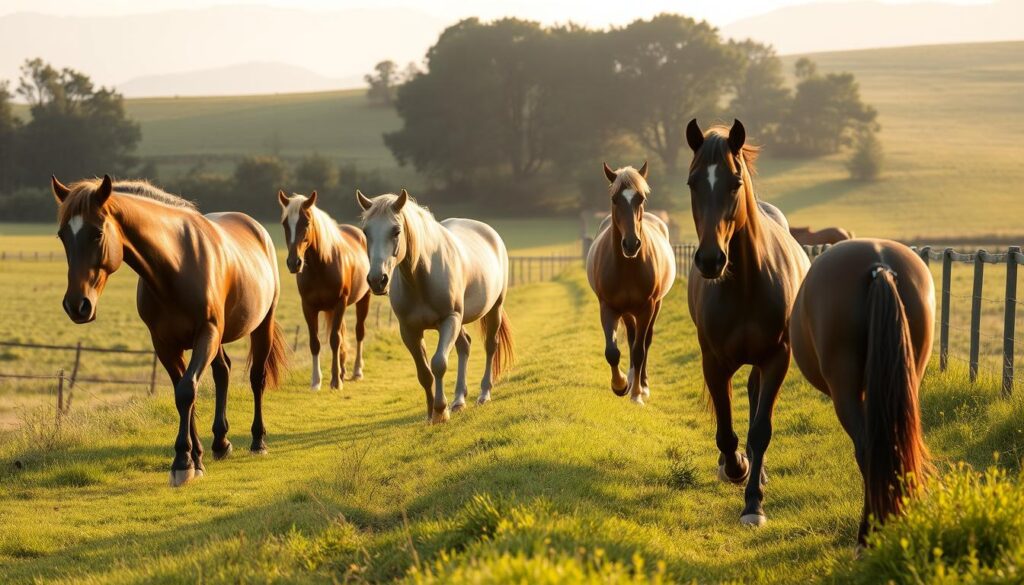
Keeping senior horses fit is all about finding the right balance. As they get older, their needs change. But it’s still important to keep them active for their health and happiness.
Senior horses are special friends in the herd. They teach younger horses important lessons. These lessons include how to communicate and get along with others.
- Gentle walking exercises
- Light groundwork training
- Short riding sessions at a relaxed pace
- Interactive herd activities
“Movement is life for horses, even in their golden years.” – Equine Wellness Expert
Low-impact activities are key for senior horses. They help keep muscles strong and joints flexible. Vets suggest exercises that fit each horse’s health and abilities.
Light activities offer many benefits for senior horses:
- Maintains cardiovascular health
- Prevents muscle atrophy
- Supports mental stimulation
- Promotes social interaction
It’s crucial to watch them closely and talk to a vet to create the right exercise plan.
Making End-of-Life Decisions
Deciding to say goodbye to a beloved horse is very hard for any owner. Making euthanasia decisions for horses needs careful thought, kindness, and expert advice.
“The kindest act of love is sometimes knowing when to let go.” – Veterinary Care Professionals
When thinking about end-of-life options, owners should look at a few important things:
- Quality of life
- Pain management effectiveness
- Mobility and basic functions
- Veterinary prognosis
Caring for retired horses means understanding their changing needs. Some key things to consider are:
- Regular veterinary check-ups
- Specialized senior horse nutrition
- Comfortable living environments
- Gentle exercise routines
Veterinarians are key in making euthanasia decisions. They can give honest opinions on a horse’s health and recovery chances.
| Decision Criteria | Evaluation Points |
|---|---|
| Physical Condition | Chronic pain, severe mobility issues |
| Treatment Options | Limited medical interventions |
| Quality of Life | Inability to perform basic functions |
Remember, making end-of-life decisions is never easy. Talking to veterinary professionals and thinking about the horse’s overall well-being can help guide this tough process.
Conclusion
Understanding horse longevity is more than just numbers. It’s about giving them the best care for their bodies, nutrition, and feelings. Each horse has its own path to success, needing love and careful attention to thrive.
To help horses live longer, focus on their health, diet, and environment. Things like genetics and exercise play big roles in their well-being. Veterinarians and owners must work together to keep horses healthy and strong.
Horses are incredibly strong and useful, even as they get older. The bond between humans and horses is deep, built on respect and understanding. By following the advice in this article, owners can make their horses’ lives better and longer.
Every horse’s life shows the love and effort from their human friends. With the right care, horses can stay lively and engaged for many years. This shows the power of love and dedication in a horse’s life.
FAQ
What is the average lifespan of a horse?
Horses usually live between 25 to 30 years. But, with great care, some can reach their 30s or even 40s. Things like breed, diet, and health care play big roles in how long a horse lives.
Do different horse breeds have different lifespans?
Yes, different breeds have different lifespans. Smaller breeds like ponies often live longer. Ponies can live into their 30s or 40s. But, bigger horses and racing horses might not live as long because of their hard work.
How can I help my horse live a longer, healthier life?
To help your horse live longer, focus on a few key areas. Give them good food, take them to the vet regularly, and take care of their teeth and hooves. Make sure they get enough exercise and manage stress. Also, keep them up to date on vaccinations and feed them a balanced diet.
What are the signs of aging in horses?
Signs of aging include graying, losing muscle, and having trouble keeping weight on. They might move slower, recover from exercise slower, and have less energy. Senior horses can also get health problems like arthritis and metabolic issues.
How do I care for a senior horse?
Caring for a senior horse means making some special changes. Change their diet to meet their needs, give them easier-to-digest food, and add supplements. Keep their exercise routine the same, but check in with the vet more often. Also, take care of their teeth and hooves, and make sure they’re comfortable.
What is the oldest recorded age for a horse?
The oldest horse on record was “Old Billy,” an English draft horse. He lived to be 62 years old. This shows that with the right care, horses can live a long time.
Do ponies live longer than horses?
Yes, ponies usually live longer than full-sized horses. Their smaller size means less strain and fewer health problems. Many ponies can live into their 30s and 40s, while bigger horses have shorter lifespans.